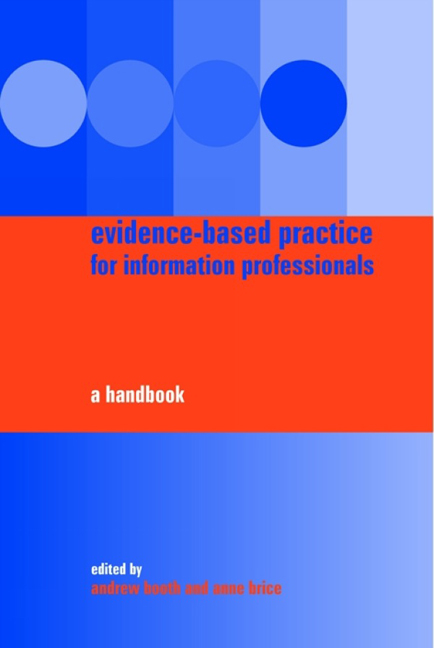Book contents
- Frontmatter
- Contents
- Foreword
- Editors and contributors
- Part 1 The context for evidence-based information practice
- Part 2 Skills and resources for evidence-based information practice
- Part 3 Using the evidence base in practice
- 13 Six domains of evidence-based information practice
- 14 Examining the evidence base for reference services and enquiry work
- Special Topic (A) Provision of a current awareness service for research staff (Guideline)
- 15 The contribution of evidence-based practice to educational activities
- Special Topic (B) How can I train my users? (Evidence Digest)
- 16 An evidence-based approach to collection management
- Special Topic (C) Electronic or paper: how do I manage my journals collection? (Evidence Digest)
- 17 Towards evidence-based management
- Special Topic (D) How do I measure the impact of my service? (Guideline)
- Special Topic (E) Should I charge and, if so, what should I charge for? (Evidence Briefing)
- 18 Evidence-based perspectives on information access and retrieval
- Special Topic (F) What are the characteristics of a good searcher? (Critically Appraised Topic)
- Special Topic (G) Which database, which interface? (Guideline) 251
- 19 Introducing an evidence-based approach to marketing and promotional activities
- Special Topic (H) Determining the information needs of practising nurses postregistration in the UK from 1990 to 2003 (Evidence Digest)
- 20 A future for evidence-based information practice?
- Index
14 - Examining the evidence base for reference services and enquiry work
from Part 3 - Using the evidence base in practice
Published online by Cambridge University Press: 08 June 2018
- Frontmatter
- Contents
- Foreword
- Editors and contributors
- Part 1 The context for evidence-based information practice
- Part 2 Skills and resources for evidence-based information practice
- Part 3 Using the evidence base in practice
- 13 Six domains of evidence-based information practice
- 14 Examining the evidence base for reference services and enquiry work
- Special Topic (A) Provision of a current awareness service for research staff (Guideline)
- 15 The contribution of evidence-based practice to educational activities
- Special Topic (B) How can I train my users? (Evidence Digest)
- 16 An evidence-based approach to collection management
- Special Topic (C) Electronic or paper: how do I manage my journals collection? (Evidence Digest)
- 17 Towards evidence-based management
- Special Topic (D) How do I measure the impact of my service? (Guideline)
- Special Topic (E) Should I charge and, if so, what should I charge for? (Evidence Briefing)
- 18 Evidence-based perspectives on information access and retrieval
- Special Topic (F) What are the characteristics of a good searcher? (Critically Appraised Topic)
- Special Topic (G) Which database, which interface? (Guideline) 251
- 19 Introducing an evidence-based approach to marketing and promotional activities
- Special Topic (H) Determining the information needs of practising nurses postregistration in the UK from 1990 to 2003 (Evidence Digest)
- 20 A future for evidence-based information practice?
- Index
Summary
Introduction
This chapter briefly defines the essentials of reference services and enquiry work before identifying questions that users or funders of such a service might seek to answer. From here the chapter considers sources that might yield answers to such questions before making a brief assessment of relevant studies that have already examined this area, assessing them for quantity and quality.
The chapter concludes with a description of priorities for future research. This chapter is followed by a special topic illustrating what research evidence tells us about current awareness services.
What is evidence-based reference/enquiry work?
The first domain identified by Crumley and Koufogiannakis (2002) is Reference/ enquiries by which they mean ‘providing services and access to information that meets the needs of library users’. Reference services fall into three distinct types:
• information service – providing answers to enquirers’ questions
• instructional service – teaching people to find information on their own
• guidance – advising and assisting users to identify and select appropriate materials on particular topics.
Instructional service potentially overlaps with the education domain (Chapter 15). However, a workable distinction is to consider that an instructional service offers task-specific instruction to achieve a specific information need whereas the educational domain covers more general non task-specific activities as required for skills transfer or lifelong learning. The complexity increases further with technological developments whereby a straightforward bibliographic enquiry might be resolved as document delivery. Technology has further complicated things as ‘subject portals’ are developed to support reference work.
Asking the question
On first appearance this domain appears to lie completely within the evidence base of the library literature. However, is the reference interview truly unique to librarianship? The consultation in medical practice is a well researched interaction between a service provider and a service user. Similarities between the reference interview and the consultation reveal intriguing areas for investigation. The literature concerning the problem or ‘heartsink’ patient has parallels in that of the difficult user (Blessinger, 2002; Fescemeyer, 2002). Interestingly, the movement towards evidence-based patient choice (EBPC) has stimulated research interest in the consultation. In a qualitative study Ford et al. (2003) conducted semi-structured interviews with key informants to identify the elements and skills required for a successful EBPC consultation.
- Type
- Chapter
- Information
- Evidence-based Practice for Information ProfessionalsA Handbook, pp. 148 - 158Publisher: FacetPrint publication year: 2004
- 1
- Cited by

